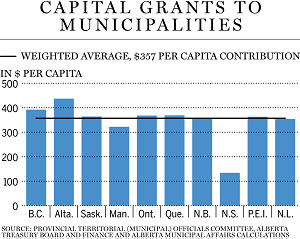 Tuesday, September 24, 2024
Tuesday, September 24, 2024  Tuesday, September 24, 2024
Tuesday, September 24, 2024 
As reported in the Calgary Herald, the MacKinnon report released Tuesday levelled a blunt warning to municipalities across Alberta — the province can’t afford to maintain existing levels of capital support.
A panel headed by former Saskatchewan finance minister Janice MacKinnon issued a swath of recommendations around funding municipal projects, but they boil down to one thing: Towns and cities should shoulder more of the cost.
The panel assessing Alberta’s finances also urged a policy around selling off public lands as a revenue tool, and wrote against current funding formulas and the recent city charter agreements made with Edmonton and Calgary.
At the heart of the capital spending recommendations is a desire to rein in Alberta’s funding levels and bring them more in line with those in other provinces.
Requiring municipalities to assume more major project costs is unlikely to sit well with cities, towns and counties. The issue is top-of-mind for Alberta municipalities, particularly given the pending 2021-22 expiration of the Municipal Sustainability Initiative (MSI) funding program.
Last year, the Alberta Urban Municipalities Association (AUMA) passed a resolution asking government to index annual funding as a fixed percentage of the province’s revenue. The resolution cited a “shared responsibility” between the province and municipalities to fund infrastructure.
Edmonton and Calgary have urged the provincial government to preserve the city charter agreements, which replace the MSI for Alberta’s two largest cities once the current funding agreement expires.
The charter links funding to provincial revenues and will see $500 million split between Calgary and the capital in 2022-23.